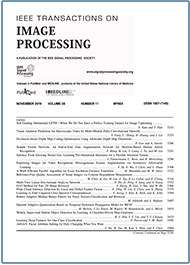- Our Story
- Publications & Resources
- Publications & Resources
- Publications
- IEEE Signal Processing Magazine
- IEEE Journal of Selected Topics in Signal Processing
- IEEE Signal Processing Letters
- IEEE Transactions on Computational Imaging
- IEEE Transactions on Image Processing
- IEEE Transactions on Information Forensics and Security
- IEEE Transactions on Multimedia
- IEEE Transactions on Signal and Information Processing over Networks
- IEEE Transactions on Signal Processing
- IEEE TCI
- IEEE TSIPN
- Data & Challenges
- Submit Manuscript
- Guidelines
- Information for Authors
- Special Issue Deadlines
- Overview Articles
- Top Accessed Articles
- SPS Newsletter
- SigPort
- SPS Resource Center
- Publications FAQ
- Blog
- News
- Dataset Papers
- Conferences & Events
- Community & Involvement
- Professional Development
- For Volunteers
- Information for Authors-OJSP
-
Home
Conferences Events IEEE Signal Processing Magazine IEEE SPL Article IEEE TIFS Article IEEE TMM Article IEEE TSP Article Jobs in Signal Processing Lectures Machine Learning Seasonal Schools Signal Processing News SPM Article SPS Distinguished Lectures SPS Newsletter Article SPS Webinar SPS Webinars SPS Webinar Series Webinar webinars
-
Our Story
What is Signal Processing?

The technology we use, and even rely on, in our everyday lives –computers, radios, video, cell phones – is enabled by signal processing. Learn More » -
Publications & Resources
-
SPS Resources
- Signal Processing Magazine The premier publication of the society.
- SPS Newsletter Monthly updates in Signal Processing
- SPS Resource Center Online library of tutorials, lectures, and presentations.
- SigPort Online repository for reports, papers, and more.
- SPS Feed The latest news, events, and more from the world of Signal Processing.
-
SPS Resources
-
Conferences & Events
-
Community & Involvement
-
Membership
- Join SPS The IEEE Signal Processing Magazine, Conference, Discounts, Awards, Collaborations, and more!
- Chapter Locator Find your local chapter and connect with fellow industry professionals, academics and students
- Women in Signal Processing Networking and engagement opportunities for women across signal processing disciplines
- Students Scholarships, conference discounts, travel grants, SP Cup, VIP Cup, 5-MICC
- Young Professionals Career development opportunities, networking
- Get Involved
-
Technical Committees
- Applied Signal Processing Systems
- Audio and Acoustic Signal Processing
- Bio Imaging and Signal Processing
- Computational Imaging
- Image Video and Multidimensional Signal Processing
- Information Forensics and Security
- Machine Learning for Signal Processing
- Multimedia Signal Processing
- Sensor Array and Multichannel
- Signal Processing for Communication and Networking
- Signal Processing Theory and Methods
- Speech and Language Processing
- Technical Working Groups
- More TC Resources
-
Membership
-
Professional Development
-
Professional Development
- Signal Processing Mentorship Academy (SigMA) Program
- Micro Mentoring Experience Program (MiME)
- Distinguished Lecturer Program
- Distinguished Lecturers
- Distinguished Lecturer Nominations
- Past Lecturers
- Distinguished Industry Speaker Program
- Distinguished Industry Speakers
- Distinguished Industry Speaker Nominations
- Industry Resources
- IEEE Training Materials
- Jobs in Signal Processing: IEEE Job Site
-
Career Resources
- SPS Education Program Educational content in signal processing and related fields.
- Distinguished Lecturer Program Chapters have access to educators and authors in the fields of Signal Processing
- Job Opportunities Signal Processing and Technical Committee specific job opportunities
- Job Submission Form Employers may submit opportunities in the area of Signal Processing.
-
Professional Development
-
For Volunteers
-
For Board & Committee Members
- Board Agenda/Minutes* Agendas, minutes and supporting documentation for Board and Committee Members
- SPS Directory* Directory of volunteers, society and division directory for Board and Committee Members.
- Membership Development Reports* Insight into the Society’s month-over-month and year-over-year growths and declines for Board and Committee Members
-
For Board & Committee Members
Popular Pages
Today's:
- Information for Authors
- IEEE Transactions on Information Forensics and Security
- (ICME 2026) 2026 IEEE International Conference on Multimedia and Expo
- Submit Your Papers for ICASSP 2026!
- IEEE Signal Processing Letters
- SPS Webinar: Self-Supervised Coordinate Projection Network for Sparse-View Computed Tomography
- Information for Authors-SPL
- Conference Call for Papers
- (ASRU 2025) 2025 IEEE Automatic Speech Recognition and Understanding Workshop
- Membership
- Submit a Manuscript
- Conferences Board
- IEEE Transactions on Signal Processing
- Information for Authors OJSP
- IEEE Transactions on Multimedia
All time:
- Information for Authors
- Submit a Manuscript
- IEEE Transactions on Image Processing
- IEEE Transactions on Information Forensics and Security
- IEEE Transactions on Multimedia
- IEEE Transactions on Audio, Speech and Language Processing
- IEEE Signal Processing Letters
- IEEE Transactions on Signal Processing
- Conferences & Events
- IEEE Journal of Selected Topics in Signal Processing
- Information for Authors-SPL
- Conference Call for Papers
- Signal Processing 101
- IEEE Signal Processing Magazine
- Guidelines
Last viewed:
- IVMSP TC Home
- (ICIP 2026) 2026 IEEE International Conference on Image Processing
- Interview with Professor Chandra R. Murthy
- JPEG Image Encryption With DC Rotation and Undivided RSV-Based AC Group Permutation
- IEEE JSTSP Special Issue on High-Dimensional Imaging: Emerging Challenges and Advances in Reconstruction and Restoration
- LININ: Logic Integrated Neural Inference Network for Explanatory Visual Question Answering
- JPEG Image Encryption With DC Rotation and Undivided RSV-Based AC Group Permutation
- Content-Aware Tunable Selective Encryption for HEVC Using Sine-Modular Chaotification Model
- How to be a Good Reviewer
- Editorial Board
- Waveforms for Computing Over the Air: A groundbreaking approach that redefines data aggregation
- Information for Authors-SPL
- (ICME 2026) 2026 IEEE International Conference on Multimedia and Expo
- IEEE Transactions on Image Processing
- IEEE Signal Processing Magazine
Local Semantic-Aware Deep Hashing With Hamming-Isometric Quantization
You are here
Publications & Resources
Transactions on Image Processing
For Authors
Top Reasons to Join SPS Today!
1. IEEE Signal Processing Magazine
2. Signal Processing Digital Library*
3. Inside Signal Processing Newsletter
4. SPS Resource Center
5. Career advancement & recognition
6. Discounts on conferences and publications
7. Professional networking
8. Communities for students, young professionals, and women
9. Volunteer opportunities
10. Coming soon! PDH/CEU credits
Click here to learn more.
Local Semantic-Aware Deep Hashing With Hamming-Isometric Quantization
Hashing is a promising approach for compact storage and efficient retrieval of big data. Compared to the conventional hashing methods using handcrafted features, emerging deep hashing approaches employ deep neural networks to learn both feature representations and hash functions, which have been proven to be more powerful and robust in real-world applications. Currently, most of the existing deep hashing methods construct pairwise or triplet-wise constraints to obtain similar binary codes between a pair of similar data points or relatively similar binary codes within a triplet. However, we argue that some critical local structures have not been fully exploited. So, this paper proposes a novel deep hashing method named local semantic-aware deep hashing with Hamming-isometric quantization (LSDH), aiming to make full use of local similarity in hash function learning. Specifically, the potential semantic relation is exploited to robustly preserve local similarity of data in the Hamming space. In addition to reducing the error introduced by binary quantizing, a Hamming-isometric objective is designed to maximize the consistency of similarity between the pairwise binary-like features and corresponding binary codes pair, which is shown to be able to improve the quality of binary codes. Extensive experimental results on several benchmark datasets, including three single-label datasets and one multi-label dataset, demonstrate that the proposed LSDH achieves better performance than the latest state-of-the-art hashing methods.
SPS Social Media
- IEEE SPS Facebook Page https://www.facebook.com/ieeeSPS
- IEEE SPS X Page https://x.com/IEEEsps
- IEEE SPS Instagram Page https://www.instagram.com/ieeesps/?hl=en
- IEEE SPS LinkedIn Page https://www.linkedin.com/company/ieeesps/
- IEEE SPS YouTube Channel https://www.youtube.com/ieeeSPS
Home | Sitemap | Contact | Accessibility | Nondiscrimination Policy | IEEE Ethics Reporting | IEEE Privacy Policy | Terms | Feedback
© Copyright 2025 IEEE - All rights reserved. Use of this website signifies your agreement to the IEEE Terms and Conditions.
A public charity, IEEE is the world's largest technical professional organization dedicated to advancing technology for the benefit of humanity.











